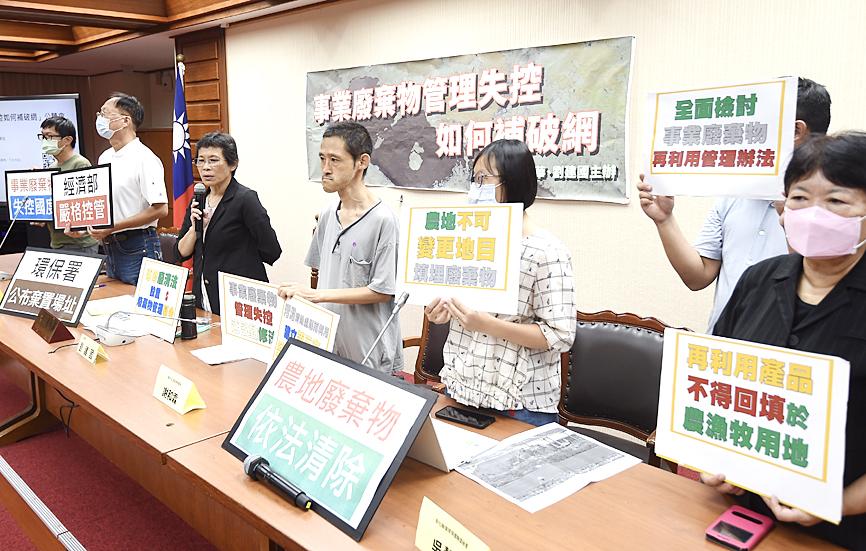Lawmakers and environmental groups yesterday called for more stringent monitoring and control of industrial hazardous waste at a news conference at the Legislative Yuan in Taipei, saying that pollution has affected Taiwan’s food safety and people’s health.
The call came in the wake of the arrest and detention of three people in southern Taiwan who allegedly ran an industrial hazardous waste treatment operation, but were instead illegally dumping the waste in landfills or at unregulated sites.
“The illegal dumping has been a recurring problem, plaguing many municipalities and counties for many years, but government agencies do not have a good handle on the problem,” New Power Party Legislator Chen Jiau-hua (陳椒華) said.

Photo: Chien Jung-fong, Taipei Times
She demanded that agencies be proactive in inspecting and verify data from companies, the quantities of the hazardous wastes, where they came from and where they end up.
She also called for stricter inspections and setting up mechanisms to manage the problem.
Last year, there were 19.84 million tonnes of industrial waste in Taiwan, environmental groups said, citing results of an investigation.
That did not include “construction surplus of sand and gravel materials” and soil already deemed polluted, they said.
A report also indicated that 84 percent of industrial hazardous waste was only superficially treated and has turned up relabeled as a different product, they added.
Much of these materials were recycled and have found their way into farmlands, aquaculture ponds and other sites, which through years of accumulation have polluted the soil and water, endangering Taiwan’s food safety and public health, Chen said.
In the past five years, 869 cases of illegal dumping were uncovered by the Environmental Protection Administration, about one case per every 2.1 days, Chen said.
“In reality, there are much more that have not been discovered, and have not yet been investigated. The actual number and amount of waste are much, much more than those that have been reported,” Chen said.
Only 8 percent of landfill sites have been treated and cleaned, but 92 percent of them are still piled up with no follow-up work or cleaning, she added.
It is urgent to amend the laws, as local governments often cannot locate the source of the waste when uncovering illegal dumping sites, and are unable to issue fines, which often results in the waste remaining in place, Taiwan Watch Institute secretary-general Herlin Hsieh (謝和霖) said.
“Even in cases when the people responsible were found, the local authorities usually request the site be cleaned within a deadline, and only when this is not met, can they apply to seize property assets to offset the cleanup costs, but most of the time, those responsible had by then transferred their assets elsewhere, and local governmental agencies cannot go in to clean up, as they lack the budget,” Hsieh said.

The Grand Hotel Taipei on Saturday confirmed that its information system had been illegally accessed and expressed its deepest apologies for the concern it has caused its customers, adding that the issue is being investigated by the Ministry of Justice Investigation Bureau. The hotel said that on Tuesday last week, it had discovered an external illegal intrusion into its information system. An initial digital forensic investigation confirmed that parts of the system had been accessed, it said, adding that the possibility that some customer data were stolen and leaked could not be ruled out. The actual scope and content of the affected data

DO THEY BITE IT? Cats have better memories than people might think, but their motivation is based entirely around the chance of getting fed Cats can remember the identity of the people who fed them the day before, Taipei-based veterinarians said on Friday, debunking a popular myth that cats have a short memory. If a stray does not recognize the person who fed them the previous day, it is likely because they are not carrying food and the cat has no reason to recognize them, said Wu Chou Animal Hospital head Chen Chen-huan (陳震寰). “When cats come to a human bearing food, it is coming for the food, not the person,” he said. “The food is the key.” Since the cat’s attention is on the food, it

A New York-based NGO has launched a global initiative to rename the nation’s overseas missions, most of which operate under the name "Taipei," to "Taiwan Representative Office (TRO)," according to a news release. Ming Chiang (江明信), CEO of Hello Taiwan, announced the campaign at a news conference in Berlin on Monday, coinciding with the World Forum held from Monday through Wednesday, the institution stated in the release. Speaking at the event, Democratic Progressive Party Legislator Huang Jie (黃捷) said she believed this renaming campaign would enable the international community to see Taiwan

TOO DANGEROUS: The families agreed to suspend crewed recovery efforts that could put rescuers in danger from volcanic gases and unstable terrain The bodies of two Taiwanese tourists and a Japanese pilot have been located inside a volcanic crater, Japanese authorities said yesterday, nearly a month after a sightseeing helicopter crashed during a flight over southwestern Japan. Drone footage taken at the site showed three bodies near the wreckage of the aircraft inside a crater on Mount Aso in Kumamoto Prefecture, police and fire officials said. The helicopter went missing on Jan. 20 and was later found on a steep slope inside the Nakadake No. 1 Crater, about 50m below the rim. Authorities said that conditions at the site made survival highly unlikely, and ruled